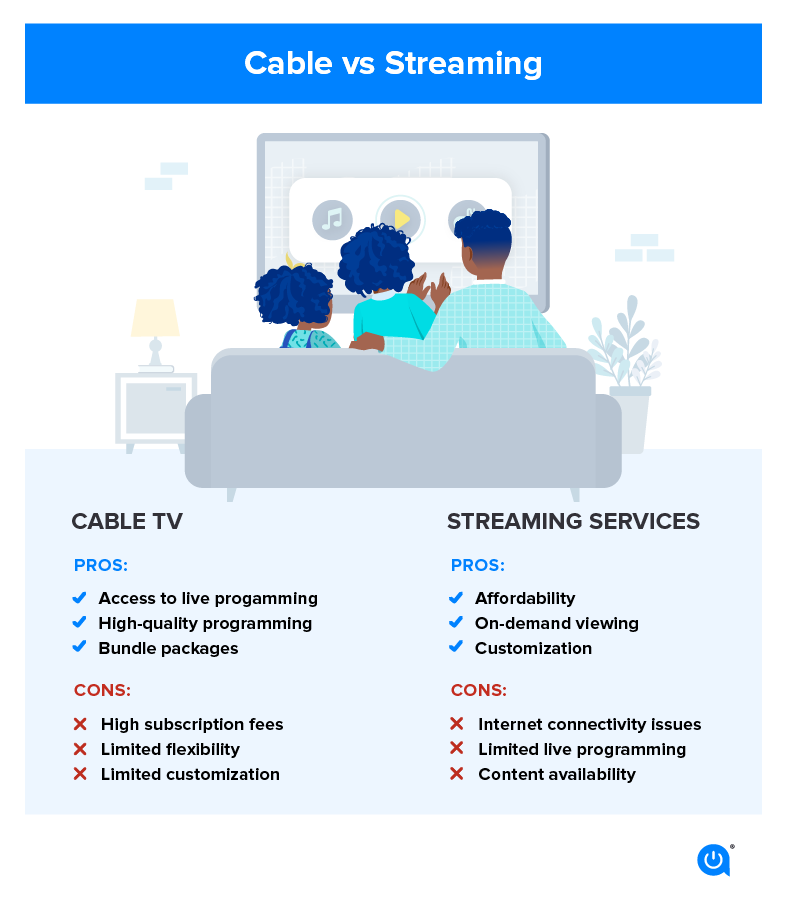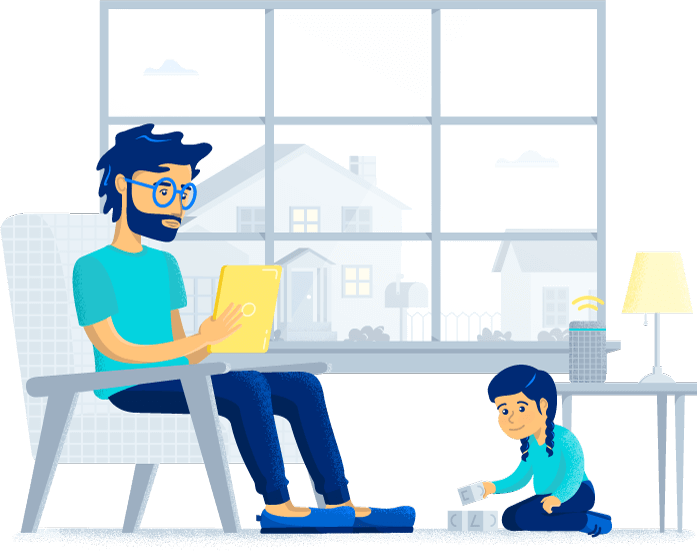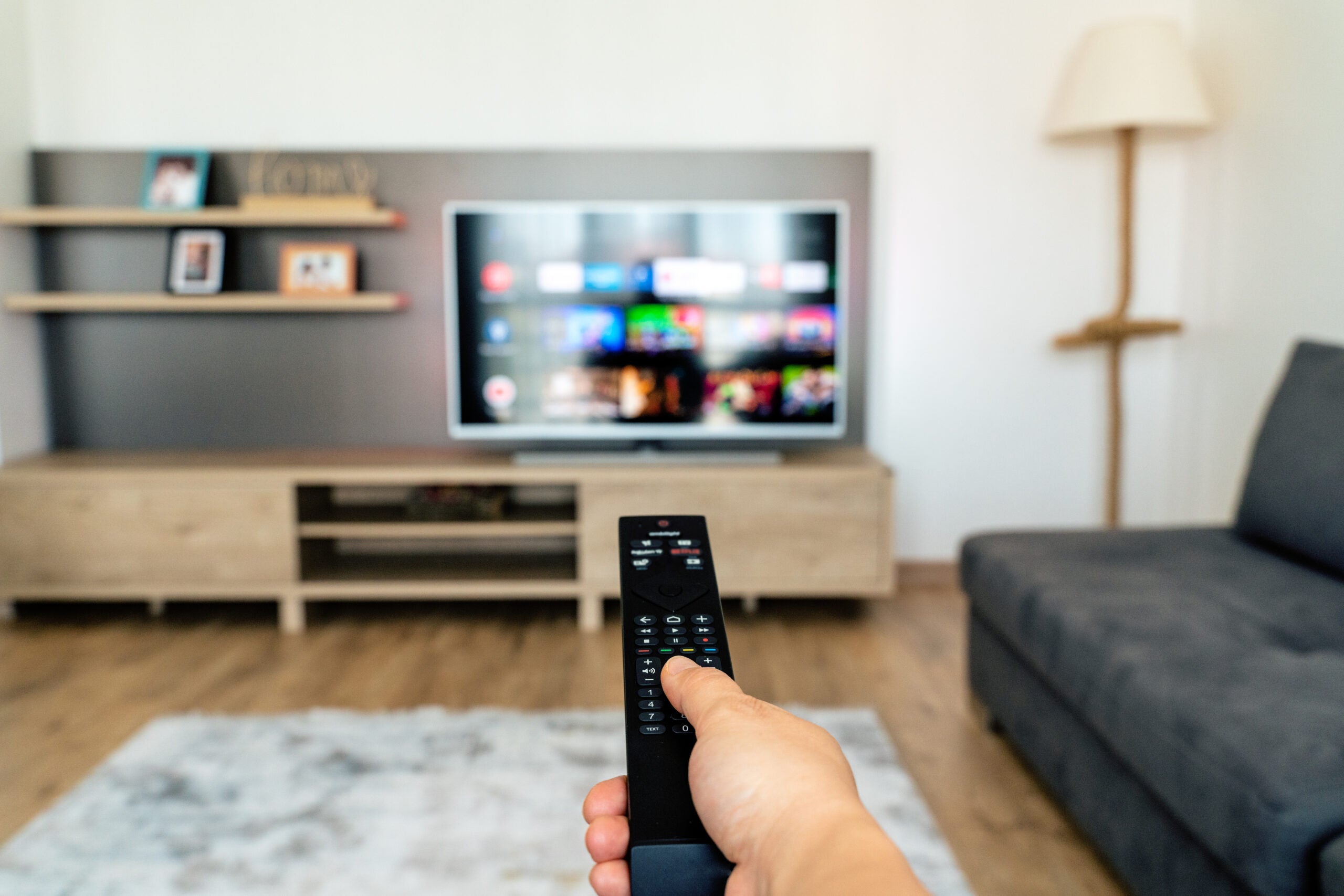Key findings
- 83% of U.S. households have at least one video streaming service subscription.
- The streaming industry will be worth over $400 billion by 2030.
- The number of cable TV subscribers has decreased to 72.2 million from 98.7 million in 2016.
Streaming services have taken the world by storm in recent years, leaving many to decide whether they should cut the cord or stick with cable TV.
83% of U.S. households have at least one video streaming service subscription and the streaming industry is expected to be worth nearly $2 trillion by 2030. The number of cable TV subscribers has also decreased by 26.5 million since 2016 – it’s safe to say many are choosing to say goodbye to hefty cable bills in favor of streaming subscriptions.
But is subscribing to streaming platforms really cheaper than cable TV service? We’ll break down the cost of streaming vs. cable so you can decide for yourself.
Advantages and disadvantages of cable vs. streaming
Streaming pros and cons
-
Cost: Streaming services are often cheaper than cable TV. You can choose from a variety of streaming services and only pay for the ones you want with no added broadcasting or equipment fees, which can save you money in the long run.
-
Flexibility: With streaming, you can watch your favorite shows and movies whenever you want on multiple devices.
-
No contracts: Most streaming services don’t require a contract, so you can cancel without penalty.
-
Live TV and DVR options: You can watch live TV with some streaming platforms, so you’re able to get the channels available with cable for a cheaper price and with DVR capabilities.
-
Internet connection: You need a reliable internet connection for streaming, especially if you are using multiple devices with more than one user in your home.
-
Content restrictions: Different streaming platforms offer different content, so some shows and movies may not be available depending on which service you have. You may need to subscribe to multiple platforms to get the content you want which will cost more.
Cable pros and cons
-
Channel selection: Cable TV offers a wide range of channels, including live sports and news, that may not be available with streaming services.
-
Reliable service: Unlike streaming, cable TV does not rely on your internet connection so you can watch your favorite shows and movies with no buffering or poor video quality.
-
DVR: With cable, you can record and watch your favorite shows and movies later.
-
Bundling opportunities: You may save on your cable TV and internet plan by bundling the services
-
Cost: Cable TV has more expensive starting prices and charges many extra fees.
-
Limited flexibility: With cable, you’re limited to watching shows and movies on the provider’s schedule.
-
Added fees: Cable TV services charge hefty equipment and broadcast fees that can add to your monthly bill.
Methodology
To compare the costs of cable vs. streaming, we looked at the monthly cost of popular streaming platforms and cable TV providers with pricing sourced directly from providers. We factored in the added cost of an internet plan at $69.00/mo.

Cable vs. streaming overview
Below, we’ve outlined the monthly cost ranges of cable and streaming services. We also included the added cost of an internet plan that adds to the monthly cost of each service. Keep in mind that these price ranges do not include taxes and extra fees.
Streaming cost overview
The different plan prices of popular streaming services Netflix, Disney+, Max and Hulu are listed below. The most basic plans with ads start as low as $6.99/mo., with ad-free plans ranging from $9.99 – $19.99/mo. We’ve included a column with the price range of each service and its plans with the median cost of internet at $69.00/mo.
| Streaming service | Cheapest plan | Ad-free plans | Price range with internet* |
|---|---|---|---|
| Netflix | $6.99/mo. (with ads) | $15.49 – $22.99/mo. | $75.99 – $91.99/mo. |
| Hulu | $7.99/mo. (with ads) | $17.99/mo. | $76.99 – $86.99/mo. |
| Max | $9.99/mo. (with ads) | $15.99/mo. | $78.99 – $84.99/mo. |
| Disney+ | $7.99/mo. (with ads) | $7.99/mo. – $13.99/mo. | $76.99 – $82.99/mo. |
The cheapest combination of internet and a streaming service is with Netflix’s cheapest plan with ads and the monthly total is about $76/mo. The most expensive streaming service plan we listed is with Netflix at $22.99/mo. on its own. With an internet plan, the cost comes to about $92/mo.
If you subscribe to only one streaming service, the monthly cost is actually quite low compared to cable TV costs. The monthly cost with streaming starts to increase once you subscribe to more than one service at a time, which is common when considering the different content offered with each.
| Streaming services | Combined cost | Combined cost with internet |
|---|---|---|
| Netflix + Hulu | $14.98 – $40.98/mo. | $83.98 – $109.98 |
| Netflix + Hulu + Max | $24.97 – $56.97/mo. | $93.97 – $125.97 |
| Netflix + Hulu + Max + Disney+ | $32.96 – $70.96/mo. | $101.96 – $139.96 |
These are a few service combination options. Competing streaming services are often priced similarly, so you can get a good idea of what you’ll be paying monthly with more than one service.
Live TV
One of the main reasons people cut the cord is the Live TV options available with streaming services. Platforms like Hulu and YouTube TV are becoming very popular for cord-cutters because they don’t involve the extra fees common with cable.
Streaming picture quality
If picture quality is important to you, YouTube TV and Hulu Plus Live TV support 1080p. Change the video bitrate setting to 4000 Kbps if you want the best streaming picture.
| Service | Price range | Cost with internet |
|---|---|---|
| YouTube TV | $72.99/mo. | $141.99/mo. |
| Hulu + Live TV | $76.99 – $89.99/mo. | $145.99 – $158.99/mo. |
| Sling TV | $40.00 – $55.00/mo. | $109.00 – $124.00/mo. |
| Philo | $25.00/mo. | $94.00/mo. |
| DIRECTV | $69.99 – $159.99/mo. | $138.99 – $228.99/mo. |
Cable cost overview
The cable TV services below have plans ranging from $24.99 – $299.95/mo., not including added fees or the cost of an internet plan. We’ve included the price range for these plans with the median cost of internet added ($69.00/mo.).
Additional costs with cable
The major downside of cable TV is the extra fees. Outside of your plan cost, expect to pay fees for regional sports and broadcast TV, equipment and other local taxes and fees. These costs vary by provider and location, but you can expect your monthly bill to be higher than your plan’s initial cost.
Cable TV fees could add up to $60 to your monthly bill, and if you want premium channel add-ons, expect to pay between $5 – $15/mo.
Satellite TV
Satellite TV is another option for watching your favorite programs. DIRECTV is an alternative to cable, but it can be more expensive, running from $69.99 to $159.99/mo, depending on the package you pick. DISH also provides satellite TV, starting at $84.99/mo.
So, which is the cheapest?
When you consider the slew of added fees with cable and the higher overall starting prices, streaming is the cheapest option, even with the cost of an internet plan or with Live TV.
Live TV services with streaming allow you to watch the channels you’d get with cable but at a base price with no added local broadcast fees.
For more broadband data reports, visit our Research Hub.
Streaming vs. cable FAQs
Whether streaming or cable is best for you is based on what you want. Cable can provide a set and schedued experience, often with local news elements. Streaming is totally customizable, allowing you to pick exactly what you want.
Yes, you will need some type of internet connection to access a streaming service.
Netflix, like most streaming services, need from 3 to 5 Mbps, and 4K/Ultra HD requires 15 Mbps.
Streaming services start at around $6.99/mo.
You can get basic cable TV for around $25 a month.
Allconnect: Let us compare providers for you
Why should you choose Allconnect? We’re the #1 broadband marketplace in the U.S, meaning you can trust us to search, compare and order internet and TV service for your home.
Get started

Written by:
Camryn Smith
Cammy is a writer with Allconnect, growing her broadband industry knowledge for over a year on the internet marketplace. Her expertise lies in home internet and broadband service with a focus on providers, plans…
Read more
Edited by:
Robin LaytonEditor, Broadband Content
-
Featured
![Discover the benefits of online entertainment]() Discover the benefits of online entertainment Robin Layton — 3 min read
Discover the benefits of online entertainment Robin Layton — 3 min read -
Featured
![10 questions you should ask before choosing an internet service]() 10 questions you should ask before choosing an internet service Ari Howard — 7 min read
10 questions you should ask before choosing an internet service Ari Howard — 7 min read -
Featured
![Data report: How Americans use the internet]() Data report: How Americans use the internet Joe Supan — 3 min read
Data report: How Americans use the internet Joe Supan — 3 min read
Latest
-
Wednesday, April 24, 2024
Why do you need an Optical Terminal Network?Taylor Gadsden — 2 min read
-
Tuesday, April 23, 2024
Worried about losing your TV signal? This is how to keep your satellite dish cleanDavid Anders — 6 min read
-
Tuesday, April 23, 2024
How to change your Wi-Fi network passwordCamryn Smith — 2 min read






